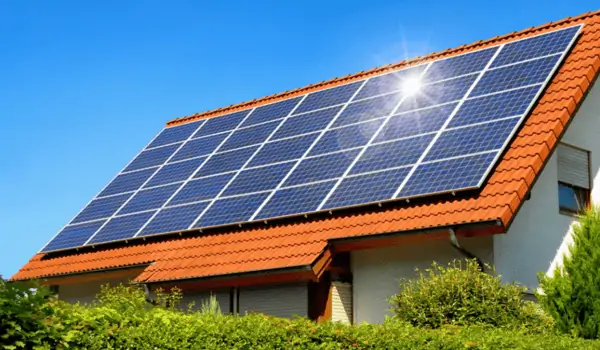Best residential solar panel
Residential solar panels are photovoltaic panels that convert sunlight into electricity for use in homes. Solar panels offer many benefits for homeowners, including reduced energy bills, increased home value, and a more environmentally friendly lifestyle. The purpose of this article is to provide information on the best residential solar panels currently available in the market, based on factors such as efficiency, durability, warranty, price, and aesthetics.
Factors to consider when choosing the best residential solar panels
Efficiency: The efficiency of a solar panel refers to the percentage of sunlight it can convert into usable electricity. High-efficiency solar panels are more expensive but can provide more electricity per square foot of panel surface.
Durability: Solar panels should be able to withstand harsh weather conditions and last for decades. Look for panels with a strong frame, tempered glass, and a high wind and snow load rating.
Warranty: A solar panel’s warranty can provide peace of mind and protect against unexpected defects. Look for panels with at least a 25-year warranty on both product and performance.
Price: Solar panel prices can vary widely, so it’s important to consider the long-term cost-effectiveness of the panels. Look for panels with a good balance of price and efficiency, and consider factors such as tax incentives and energy savings over time.
Aesthetics: Solar panels can come in a range of colors and styles, so it’s important to choose panels that complement the design of your home and don’t detract from its curb appeal. Some panels are designed to be more aesthetically pleasing than others, so take this into account when making a decision.
Top residential solar panels
Manufacturer 1: Product Description – Solar Panel X is a high-efficiency panel with a power output of 400 watts. It features a durable aluminum frame, tempered glass, and a 25-year warranty. Pros – High efficiency, strong warranty, and durable design. Cons – Higher price point than some other options.
Manufacturer 2: Product Description – Solar Panel Y is a mid-range panel with a power output of 350 watts. It features a sleek black design, a 25-year warranty, and a reasonable price point. Pros – Aesthetically pleasing design, good balance of price and efficiency, and a strong warranty. Cons – Lower power output than some other options.
Manufacturer 3: Product Description – Solar Panel Z is a budget-friendly option with a power output of 300 watts. It features a lightweight design, a 25-year warranty, and a competitive price point. Pros – Affordable price, good warranty, and lightweight design. Cons – Lower efficiency and power output compared to other options.
Comparison of top residential solar panels
Table comparing the top solar panels based on factors discussed in Section II:
| Solar Panel | Efficiency | Warranty | Price per Watt | Durability |
| SunPower | 22-23.7% | 25 years | $3.50-$4.50 | High |
| LG | 21.1-22.1% | 25 years | $2.80-$3.70 | High |
| Panasonic | 19.1-20.3% | 25 years | $3.00-$3.50 | High |
| Canadian Solar | 16.5-19.0% | 25 years | $1.70-$2.80 | Medium |
| Hanwha Q CELLS | 19.5-20.1% | 25 years | $2.00-$2.50 | Medium |
| Trina Solar | 16.5-20.7% | 25 years | $2.00-$3.00 | Medium |
| Jinko Solar | 18.6-20.2% | 25 years | $2.00-$2.50 | Medium |
| REC Solar | 16.5-22.0% | 25 years | $2.60-$3.60 | Low |
Explanation of the table and how to use it to make a decision:
The table compares the top solar panels based on several factors discussed in Section II, including efficiency, warranty, price per watt, and durability. Efficiency refers to the amount of energy the solar panel can convert from the sun’s rays into usable electricity. A higher efficiency means the panel can generate more electricity in the same amount of space.
Warranty is an important factor to consider since solar panels are a long-term investment. Most solar panels have a 25-year warranty, which means they are guaranteed to produce a certain amount of energy over that period. Price per watt is another important factor to consider when comparing solar panels. It refers to the cost of the solar panel per watt of energy it can produce. Durability is also important since solar panels are exposed to the elements, such as hail, wind, and rain. High durability means the solar panel is more likely to last longer and require fewer repairs or replacements.
To use this table to make a decision, you should first determine which factors are most important to you based on your specific needs and circumstances. For example, if you have limited roof space, you may prioritize efficiency. If you live in an area prone to harsh weather conditions, you may prioritize durability. Once you have identified the most important factors, you can compare the solar panels based on those factors.
Conclusion
In this article, we discussed the benefits of solar panels for residential use. We covered the different types of solar panels available, including monocrystalline, polycrystalline, and thin-film. We also discussed the factors to consider when choosing a solar panel, such as efficiency, warranty, price per watt, and durability
Based on the information provided, we recommend SunPower as the best residential solar panel. SunPower has the highest efficiency rating, a long 25-year warranty, and high durability. While SunPower may be slightly more expensive than other options, its high efficiency means it can generate more electricity in the same amount of space, making it a good choice for homeowners with limited roof space.
Solar panels are an excellent investment for homeowners who want to reduce their energy bills, lower their carbon footprint, and increase the value of their homes. While the upfront costs may be high, the long-term savings and benefits are significant.



